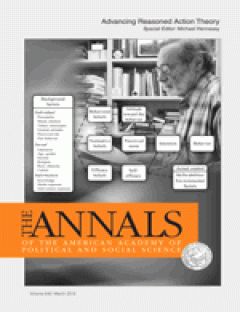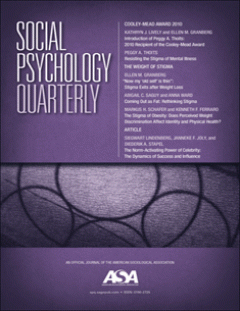Filter by

The Reasoned Action Model : Directions for Future Research
The reasoned action model (RAM) of Fishbein and Ajzen has been highly influential in the social and health sciences. This article describes three areas for future research that should expand its explanatory power. One area of research focuses on an idiographic RAM that encourages researchers to pursue the estimation of RAM parameters on a per-individual level rather than through traditional nom…
- Edition
- Vol. 640 no. 1, March 2012,pp. 58-80
- ISBN/ISSN
- 00027162
- Collation
- -
- Series Title
- The ANNALS of the American Academy of Political and Social Science
- Call Number
- -

Beliefs Underlying Eating Better and Moving More : Lessons Learned from Compa…
The reasoned action approach has been used to identify the determinants of a behavior to be modified by social and behavioral interventions. Information on the specific beliefs underlying behavioral decisions is vital to intervention design. More attention is needed on the salient belief elicitation�a critical step in a theory-based formative research process. This article considers the methodo…
- Edition
- Vol. 640 no. 1, March 2012,pp. 81-100
- ISBN/ISSN
- 00027162
- Collation
- -
- Series Title
- The ANNALS of the American Academy of Political and Social Science
- Call Number
- -

Perceived Behavioral Control in Reasoned Action Theory : A Dual-Aspect Interp…
The inclusion of perceptions of control over behavioral performance has importantly advanced the ability of reasoned action theory to explain behavioral intentions and predict behavior. In consequence, the theory has usefulness as a tool for developing behavior change interventions. Despite the theoretical and practical importance of a perceived behavioral control construct, there remains ambig…
- Edition
- Vol. 640 no. 1, March 2012,pp. 101-117
- ISBN/ISSN
- 00027162
- Collation
- -
- Series Title
- The ANNALS of the American Academy of Political and Social Science
- Call Number
- -

Developing Media Interventions to Reduce Household Sugar-Sweetened Beverage C…
In 2010, the city of Philadelphia launched a media campaign to reduce the consumption of sugar-sweetened beverages (SSBs) in homes with children as a strategy to combat obesity. Using the integrative model (IM) of behavioral change and prediction, a theory-based precampaign survey of Philadelphia parents was conducted to determine the most effective message content. Results indicated that inten…
- Edition
- Vol. 640 no. 1, March 2012,pp. 118-135
- ISBN/ISSN
- 00027162
- Collation
- -
- Series Title
- The ANNALS of the American Academy of Political and Social Science
- Call Number
- -

Understanding Tailored Internet Smoking Cessation Messages : A Reasoned Actio…
Although message tailoring has been shown to produce experimental effects in previous studies, the cognitive mechanisms through which tailoring works have not been sufficiently studied. Using the integrative model to predict intentions to use the nicotine replacement patch among adult smokers, this study examines how tailoring theoretical elements of the integrative model is effective in changi…
- Edition
- Vol. 640 no. 1, March 2012,pp. 136-149
- ISBN/ISSN
- 00027162
- Collation
- -
- Series Title
- The ANNALS of the American Academy of Political and Social Science
- Call Number
- -

The Reasoned Action Approach in HIV Risk-Reduction Strategies for Adolescents
Adolescents worldwide are at high risk for adverse consequences of sexual activity, including HIV, other sexually transmitted diseases, and unintended pregnancy. Effective intervention strategies are needed to address this risk. This article discusses the advantages of the reasoned action approach for developing such strategies, including the ability to integrate population-specific qualitative…
- Edition
- Vol. 640 no. 1, March 2012,pp. 150-172
- ISBN/ISSN
- 00027162
- Collation
- -
- Series Title
- The ANNALS of the American Academy of Political and Social Science
- Call Number
- -

A Reasoned Action Approach to HIV Prevention for Persons with Serious Mental …
There is confusion regarding reason and rational thought as a precondition for interventions designed using a reasoned action approach. To test their feasibility, two interventions were developed for use with persons with mental illnesses, using the reasoned action model. Preventing AIDS through Health (PATH) was delivered one-on-one by case managers to persons with mental illnesses who were HI…
- Edition
- Vol. 640 no. 1, March 2012,pp. 173-188
- ISBN/ISSN
- 00027162
- Collation
- -
- Series Title
- The ANNALS of the American Academy of Political and Social Science
- Call Number
- -

The emergence of popular personal finance magazines and the risk shift in Ame…
This study considers the emergence of personal finance magazines in the US after the Second World War. It examines an instance when a possible relationship existed between a media genre�s emergence and shifts in the general political economy. It suggests that the appearance of the personal finance genre was related to the shift in the American political economy from corporate liberalism to neol…
- Edition
- Vol. 34 no. 1, January 2012,pp. 3-20
- ISBN/ISSN
- 01634437
- Collation
- -
- Series Title
- Media Culture Society
- Call Number
- -

‘We’re a very normal family’: Representing the mundane in Channel 4’s…
In 1974 Paul Watson�s The Family pioneered the �fly-on-the-wall� technique to build a picture of family life that also exposed inequalities contained in British society. Today, film-maker Jonathan Smith, has updated this format using technologies usually found in reality programming to focus on the mundane practices of family life, in Channel 4�s The Family (2008). However, instead of the meta-…
- Edition
- Vol. 34 no. 1, January 2012,pp. 21-35
- ISBN/ISSN
- 01634437
- Collation
- -
- Series Title
- Media Culture Society
- Call Number
- -

At the origin of a global industry : The TV format trade as an Anglo-American…
Many of today�s popular TV programmes are formats that are adapted for local audiences as they travel from country to country. It is an industry that was transformed in the late 1990s by four �super-formats� (Who Wants to Be a Millionaire?, Survivor, Big Brother and Idols) and that is today worth an estimated �3.1 billion per year. This article focuses on the evolution that explains the emergen…
- Edition
- Vol. 34 no. 1, January 2012,pp. 36-52
- ISBN/ISSN
- 01634437
- Collation
- -
- Series Title
- Media Culture Society
- Call Number
- -

The institutionalization of YouTube : From user-generated content to professi…
This article explores the institutionalization of YouTube: its transformation from user-generated content (UGC) � oriented as a virtual village � into a professionally generated content (PGC) video site, especially after being purchased by Google. YouTube has influenced the traditional media environment, but at the same time this new medium imitates the rules of the old media, including legally…
- Edition
- Vol. 34 no. 1, January 2012 ,pp. 53-67
- ISBN/ISSN
- 01634437
- Collation
- -
- Series Title
- Media Culture Society
- Call Number
- -

The double bind : Women, honour and sexuality in contemporary Ireland
Irish women are caught in contradictory sexual discourses which create a cultural double bind. The legacy of Catholic Church teaching, in which the sexual honour of women revolves around their innocence and subservience, still lingers. This is gradually being replaced by media messages and images which portray women as sexually equal and independent. However, the media also portray sexually ind…
- Edition
- Vol. 34 no. 1, January 2012,pp. 68-82
- ISBN/ISSN
- 01634437
- Collation
- -
- Series Title
- Media Culture Society
- Call Number
- -

Blogs, genes and immigration : Online media and minimal politics
This article explores the contribution of the concept of �minimal politics� to understanding contemporary blogging. Politics is often used to refer only to state actions or to very rare ruptures to existing formations; citizens� and social media are often only considered successful if they influence political leaders or lead to radical social change. The perspective adopted in this article, dra…
- Edition
- Vol. 34 no. 1, January 2012,pp. 83-100
- ISBN/ISSN
- 01634437
- Collation
- -
- Series Title
- Media Culture Society
- Call Number
- -

Culture, Cooperation, and the General Welfare
Solutions to social dilemmas require cooperation. Given that there are commonly multiple avenues for cooperation, sometimes social dilemmas require coordination of strategies in addition to sufficient cooperation to be successful. This study examines one social dilemma where such coordination is necessary: supporting the general welfare. Using World Values Survey data from 33 nations, we compar…
- Edition
- Vol. 74 no. 4, December 2011,pp. 341-360
- ISBN/ISSN
- 01902725
- Collation
- -
- Series Title
- Social Psychology Quarterly
- Call Number
- -

Job Burnout and Couple Burnout in Dual-earner Couples in the Sandwiched Gener…
We use existential theory as a framework to explore the levels of and relationship between job and couple burnout reported by dual-earner couples in the �sandwich generation� (i.e., couples caring both for children and aging parents) in a sample of such couples in Israel and the United States. This comparison enables an examination of the influence of culture (which is rarely addressed in burno…
- Edition
- Vol. 74 no. 4, December 2011,pp. 361-386
- ISBN/ISSN
- 01902725
- Collation
- -
- Series Title
- Social Psychology Quarterly
- Call Number
- -

The Emergence of Embedded Relations and Group Formation in Networks of Compet…
This study examines how and when small networks of self-interested agents generate a group tie or affiliation at the network level. A group affiliation is formed when actors (a) perceive themselves as members of a group and (b) share resources with each other despite an underlying competitive structure. We apply a concept of structural cohesion to small networks of exchange and identify two dim…
- Edition
- Vol. 74 no. 4, December 2011,pp. 387-413
- ISBN/ISSN
- 01902725
- Collation
- -
- Series Title
- Social Psychology Quarterly
- Call Number
- -

Managing Emotional Manhood : Fighting and Fostering Fear in Mixed Martial Arts
Based on two years of fieldwork and over 100 interviews, we analyze mixed martial arts fighters� fears, how they managed them, and how they adopted intimidating personas to evoke fear in opponents. We conceptualize this process as �managing emotional manhood,� which refers to emotion management that signifies, in the dramaturgical sense, masculine selves. Our study aims to deepen our understand…
- Edition
- Vol. 74 no. 4, December 2011,pp. 414-437
- ISBN/ISSN
- 01902725
- Collation
- -
- Series Title
- Social Psychology Quarterly
- Call Number
- -

Minnowbrook : Tradition, Idea, Spirit, Event, Challenge
This article sets the stage for the special issue by explaining the tradition, idea, spirit, event, and challenge of Minnowbrook.
- Edition
- Vol. 21, Issue supplement 1, January 2011, Pp. i1-
- ISBN/ISSN
- 10531858
- Collation
- -
- Series Title
- Journal of Public Administration Research and Theory
- Call Number
- -

Wrestling with Intellectual Diversity in Public Administration : Avoiding Dis…
Public Administration (PA) is a field characterized by great diversity in theoretical approaches and methodological tactics. This wide scope lends itself to potential epistemological and methodological fragmentation, which prevents scholars from adequately appreciating and building on each other's work. Although many scholars value PA's theoretical and methodological diversity, this intellectua…
- Edition
- Vol. 21, Issue suppl 1, January 2011, Pp. i13-i28
- ISBN/ISSN
- 10531858
- Collation
- -
- Series Title
- Journal of Public Administration Research and Theory
- Call Number
- -

Public Administration in Dark Times : Some Questions for the Future of the Field
This essay identifies two problems that impede the ability of public administration to govern effectively in dark times. First, public administration has failed to adequately acknowledge itself as an arbiter of political conflict and as a discipline responsible for shaping societal affairs. Second, the field is entrenched in a bureaucratic pathology that limits its capacity to address complex p…
- Edition
- Volume 21, Issue suppl 1, January 2011,Pp. i29-i43
- ISBN/ISSN
- 10531858
- Collation
- -
- Series Title
- Journal of Public Administration Research and Theory
- Call Number
- -
 Computer Science, Information & General Works
Computer Science, Information & General Works  Philosophy & Psychology
Philosophy & Psychology  Religion
Religion  Social Sciences
Social Sciences  Language
Language  Pure Science
Pure Science  Applied Sciences
Applied Sciences  Art & Recreation
Art & Recreation  Literature
Literature  History & Geography
History & Geography